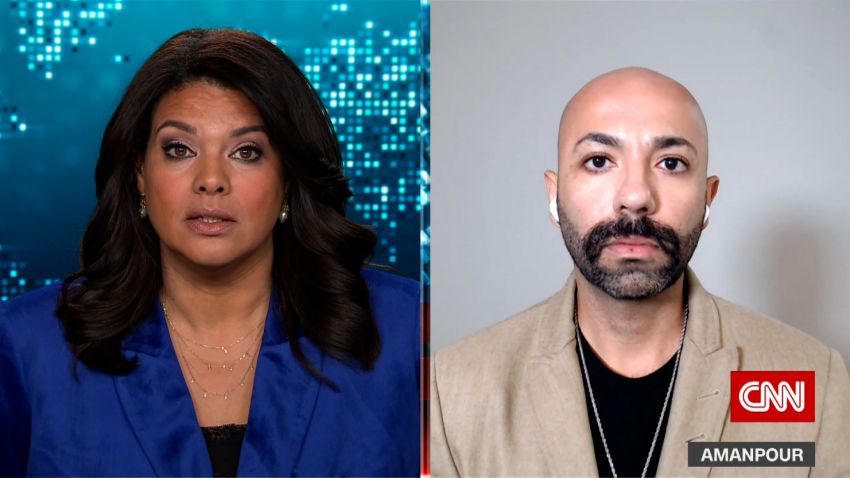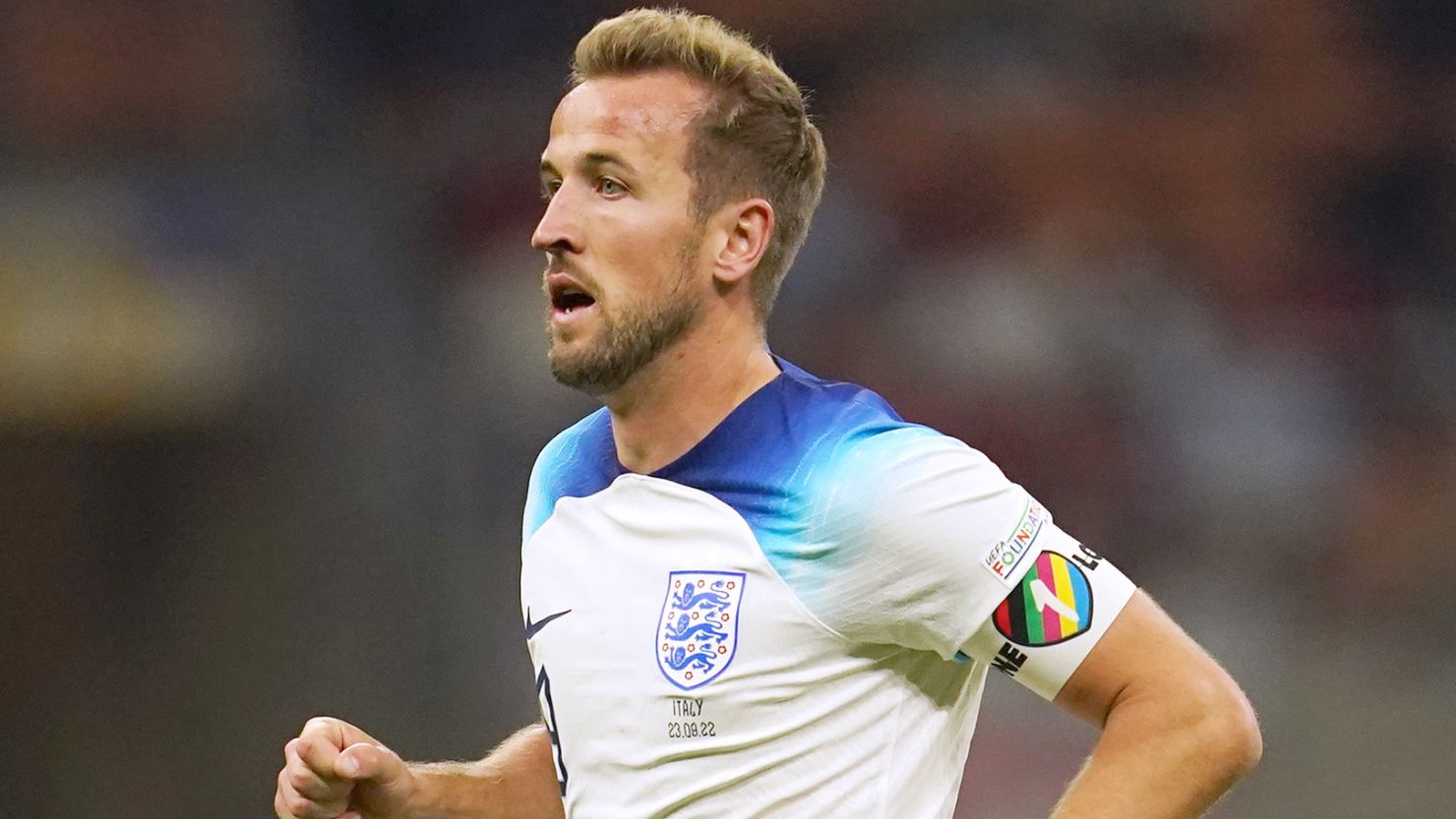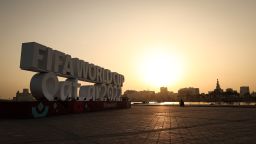The captains of several European teams will not wear “OneLove” armbands at the World Cup in Qatar due to the danger of receiving yellow cards.
England, the Netherlands, Belgium, Denmark, Germany, Switzerland and Wales were set to participate in the “OneLove” campaign to promote inclusion and oppose discrimination.
But those countries’ associations said in a statement on Monday that the armband – which features a striped heart in different colors to represent all heritages, backgrounds, genders and sexual identities – would not be worn in Qatar.
“FIFA [football’s global governing body] has been very clear that it will impose sporting sanctions if our captains wear the armbands on the field of play,” the joint statement read.
“As national federations, we can’t put our players in a position where they could face sporting sanctions including bookings, so we have asked the captains not to attempt to wear the armbands in FIFA World Cup games.”
“We were prepared to pay fines that would normally apply to breaches of kit regulations and had a strong commitment to wearing the armband. However, we cannot put our players in the situation where they might be booked or even forced to leave the field of play,” the statement added.
The decision not to showcase the armband in Qatar came hours before England’s opening game against Iran and the Netherlands’ game against Senegal later on Monday. Wales is currently playing the US.
The countries said they were “frustrated” by what they described as FIFA’s “unprecedented” decision to sanction the captains should they wear the armband.
“We wrote to FIFA in September informing them of our wish to wear the One Love armband to actively support inclusion in football, and had no response. Our players and coaches are disappointed – they are strong supporters of inclusion and will show support in other ways,” the statement continued.

Decision and delay criticized
England manager Gareth Southgate said FIFA’s position should have been made “clearer” earlier.
“I do understand FIFA’s situation in that you can set a precedent and it’s very difficult then, where do you draw the line?” Southgate said at a press conference after England’s 6-2 victory against Iran.
“I think in an ideal world that would have been a much clearer situation earlier, but it’s not something that’s been a distraction for us, because we, as I said yesterday, we had to focus on the football, you know, there’s so much else going on, but we can’t be involved in that,” he added.
“People know what we stand for,” Southgate said. “People know this group of players, you know, we’re taking the knee because it’s something we feel we can make a difference with. And there are some things that I’m not sure we’re going to be able to make a difference with and therefore we should channel our energies in the right directions.”
France has been part of the season-long campaign but last week captain Hugo Lloris told reporters that he would “respect” the local culture during the tournament.
The Dutch football association, meanwhile, said on Monday that it was “deeply disappointed” that captain Virgil van Dijk would get a yellow card if he were to wear the armband on the pitch.
Ahead of his country’s World Cup opener on Wednesday, Belgium midfielder Youri Tielemans called the decision “a shame.”
Tielemans said: “I just think it’s a shame that it’s not happening because it’s just a fight against discrimination all around the world, not just here, but in Europe as well and in other countries. And I just think it’s a shame that it’s not happening and we’ll just have to move on from it.”
Tielemans’ Belgium teammate Thomas Meunier said FIFA purposely waited to declare the ban. “I think it’s a smart move from FIFA because they knew before that this would lead to protests and a lot of words and interviews, and of course negative words about Qatar,” the defender said.
“So the best thing for them was to wait until the last moment to get everyone in the country, and after to decide and to apply the rules that they want to apply. And not the rules for everyone.”
‘Everyone is welcome’
In the buildup to the World Cup, Qatar – where homosexuality is illegal and punishable by up to three years in prison – has come under criticism for its stance on LGBTQ rights.
A report from Human Rights Watch, published last month, documented cases as recently as September of Qatari security forces arbitrarily arresting LGBT people and subjecting them to “ill-treatment in detention.”
However, the country has insisted that “everyone is welcome” at the tournament, adding in a statement to CNN this month that “our track record has shown that we have warmly welcomed all people regardless of background.”
A statement sent to CNN last week on behalf of the Supreme Committee for Delivery & Legacy (SC) which, since its formation in 2011, has been responsible for overseeing the infrastructure projects and planning for the World Cup, said it was committed to “an inclusive and discriminatory-free” World Cup, pointing to the fact that the country had, it said, hosted hundreds of international and regional sporting events since being awarded the World Cup in 2010.
Prior to countries announcing their captains would not wear the armband in Qatar, FIFA brought forward its own “No Discrimination” campaign and said all 32 captains would have the opportunity to wear an armband linked to the campaign.
“I have been speaking about this subject with the country’s [Qatar] highest leadership,” said FIFA president Gianni Infantino in a press conference Saturday.
“They have confirmed, and I can confirm, that everyone is welcome. If anyone says the opposite, it’s not the opinion of the country and it’s certainly not the opinion of FIFA.”
But FIFA’s decision to sanction players for wearing the “OneLove” armband has nevertheless drawn anger, with the Football Supporters’ Association, the representative body for football supporters in England and Wales, saying it “feels betrayed.”
“Since 2010 we have been raising questions about the suitability of Qatar as a World Cup host,” a statement from the FSA said.
“Everyone could see this coming and it’s astonishing that, on the morning of England’s World Cup opener, FIFA are censoring players … who wish to share a positive message.”
Meanwhile, Steve Cockburn, Amnesty International’s Head of Economic and Social Justice, pointed out that “agreements on armbands, and better protections for LGBT communities, should have been reached a long time ago.”
Qatar’s Supreme Committee deflects armband ban controversy
Qatar dismissed the ‘OneLove’ armband controversy as a matter between FIFA and international teams, reiterating that “everybody is welcome” regardless of “orientation.”
“Everything that happens on the pitch is a FIFA matter,” the spokesperson of the SC, Fatma Al Nuaimi, told CNN’s Becky Anderson in Doha.
“There’s nothing to comment about, I think it’s between … the teams and FIFA directly,” Al Nuaimi said.
In response to players showing forms of protest at Qatar 2022, including the England team taking the knee, and Iran players choosing not to sing the national anthem in support of protests back home, Al Nuaimi said the World Cup is “a platform” for people to express their “values and beliefs.”


